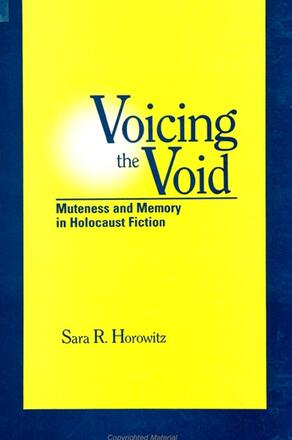
Voicing the Void
Muteness and Memory in Holocaust Fiction
Alternative formats available from:
Explores the connections between muteness and the complicated acts of survival, testimony, memory, and interpretation, through focused readings of Holocaust fiction by Kosinski, Wiesel, Tournier, Ida Fink, and others.
Description
CHOICE 1997 Outstanding Academic Books
Through new close readings of Holocaust fiction, this book takes the field of Holocaust Studies in an important new direction. Reading a wide range of narratives representing different nationalities, styles, genders, and approaches, Horowitz demonstrates that muteness not only expresses the difficulty in saying anything meaningful about the Holocaust—it also represents something essential about the nature of the event itself. The radical negativity of the Holocaust ruptures the fabric of history and memory, emptying both narrative and life of meaning. At the heart of Holocaust fiction lies a tension between the silence that speaks the rupture, and the narrative forms that attempt to represent, to bridge it.
This book argues that the central issues in Holocaust historiography and literary criticism are not simply prompted by the fictionality of imaginative literature—they are already embedded as self-critique in the fictional narratives. While the current critical discourse argues either for or against the unrepresentability of these events (and thus the appropriateness of imaginative literature), this book develops the theme of muteness as the central way in which literary texts explore and provisionally resolve these central issues. Focusing on the problem of muteness helps unfold the ambivalences and ambiguities that shape the way we read Holocaust fiction, and the way we think about the Holocaust itself.
Sara Horowitz is Associate Professor of English and Comparative Literature and Director of the Jewish Studies Program at the University of Delaware.
Reviews
"This is an outstanding book. Sara Horowitz displays a quality of authority and control that place her squarely in the line of Lawrence Langer, Alvin Rosenfeld, Sidra Ezrahi, and a very few others who have made the Holocaust the subject of serious and disciplined literary analysis.
"The subject of voice versus muteness is central enough to find expression in the most important imaginative works on the Holocaust. It also resonates with many of the larger concerns in literary studies today about the place of language in human affairs and in the human sciences, yet it never loses sight of its human subject, nor does it submit to critical fashion. The author never raises method over content to make the Holocaust merely a text to be dissected as such. This book reflects a tragic awareness of the seriousness of the Holocaust at the same time as it avoids patronizing the subject by avoiding critical analysis." — Alan Mintz, Brandeis University